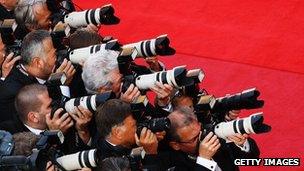Photographers' anger at law change over 'orphan works'
- Published

Companies wishing to use pictures would need to carry out a "diligent search" for the owner
Photography groups have reacted angrily to new legislation passed in Parliament over the use of copyrighted material when the owner cannot be contacted.
Photographs or other creative works can be used without the owners' explicit permission as long as a "diligent search" has taken place.
Campaigners said the new act paved the way for the exploitation of images posted on the internet.
But the government said the act made "copyright licensing more efficient".
The Enterprise and Regulatory Reform Act was passed by Parliament last week. The government said it would support "the UK's enterprise culture and help make it one of the best places to do business".
But campaign group Stop43, which represents a wide range of photographers and agencies, external, said the act was "premature, ill thought-out and constitutionally improper".
Veteran British photographer David Bailey shared this concern. In a note published on Stop43's site, he said: "Why the rush?
"A scheme, the Copyright Hub - a scheme backed by the government - is being developed to ensure that those who wish to find our pictures can not only do so quickly online, but also find the contact details of the pictures' owners.
"You are about to put the cart before the horse."
The full text of the act will not be published until Thursday.
'Instagram act'
For the first time, these "orphan works" - as they are known - can be licensed for commercial or non-commercial use.
However, in order to do so, the company in question would have to prove to an independent body that a "diligent search" to find and approach the copyright holder had taken place without success.
If the body is satisfied there has been a sufficient search, it would then allow the company to pay a licence fee to use the material.
This money is then to be held by the independent body, and can be claimed by the rights holder should they come forward at a later date.
Writing for technology news website The Register, journalist Andrew Orlowski dubbed the changes, external as the "Instagram act", in reference to a recent furore surrounding the use of images posted to the image-sharing social network.
"Most digital images on the internet today are orphans - the metadata is missing or has been stripped by a large organisation," Orlowski wrote.
Often, clues about who has taken an image are contained within the file itself as part of its metadata - but this data can often be stripped from the file during the uploading process to popular sites.
Orlowski added: "The act will permit the widespread commercial exploitation of unidentified work - the user only needs to perform a 'diligent search'. But since this is likely to come up with a blank, they can proceed with impunity."
'Unnecessary barriers'
The Department for Business, Innovations and Skills (BIS) defended the act. "The powers in the Enterprise and Regulatory Reform Act 2013 aim to make copyright licensing more efficient," a spokeswoman said.
"They are intended to help remove unnecessary barriers to the legitimate use of works while preserving the interests of rights holders.
"The powers do not remove copyright for photographs or any other works subject to copyright, nor do they allow anyone to use a copyright work without permission and free of charge."
Intellectual property specialist Iain Connor, who is a partner at law firm Pinsent Masons, told the BBC that while he agreed with a need to allow the use of orphan works in principle, it was the implementation that posed the biggest challenge.
'A nonsense'
"The key to this is going to be whether or not there is going to be appropriate secondary legislation that will set up some sort of system that is good for users to get the content they want, but good for the industry to make sure they are remunerated appropriately for their work."
The exact workings of the new legislation in relation to copyright are yet to be formalised. Statutory instruments will be implemented at a later date.
Like many photographers and copyright holders, Mr Connor - who has represented photographic agencies - expressed concern that crucial legislation regarding copyright changes has been included in bills covering wide-reaching policy areas.
"If this is copyright legislation, this deserves an act called the Copyright Act," he said.
"This should not be tagged into a piece of legislation that has nothing to do with copyright. It's a nonsense."
- Published21 December 2012
- Published20 December 2012
- Published19 December 2012
- Published18 December 2012